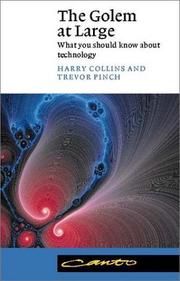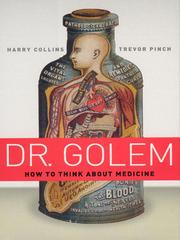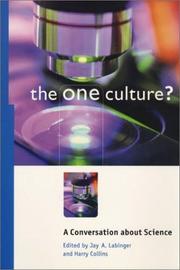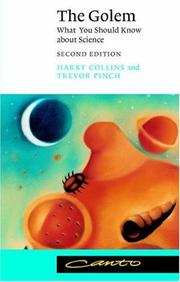| Listing 1 - 6 of 6 |
Sort by
|
Book
ISBN: 9780262036184 9780262340045 0262340046 9780262340052 0262340054 0262036185 9780262535120 0262535122 Year: 2017 Publisher: Cambridge, Massachusetts ; London, England : The MIT Press,
Abstract | Keywords | Export | Availability | Bookmark
 Loading...
Loading...Choose an application
- Reference Manager
- EndNote
- RefWorks (Direct export to RefWorks)
"Scientists have been trying to confirm the existence of gravitational waves for fifty years. Then, in September 2015, came a 'very interesting event' (as the cautious subject line in a physicist's email read) that proved to be the first detection of gravitational waves. In Gravity's Kiss, Harry Collins -- who has been watching the science of gravitational wave detection for forty-three of those fifty years and has written three previous books about it -- offers a final, fascinating account, written in real time, of the unfolding of one of the most remarkable scientific discoveries ever made. Predicted by Einstein in his theory of general relativity, gravitational waves carry energy from the collision or explosion of stars. Dying binary stars, for example, rotate faster and faster around each other until they merge, emitting a burst of gravitational waves. It is only with the development of extraordinarily sensitive, highly sophisticated detectors that physicists can now confirm Einstein's prediction. This is the story that Collins tells. Collins, a sociologist of science who has been embedded in the gravitational wave community since 1972, traces the detection, the analysis, the confirmation, and the public presentation and the reception of the discovery -- from the first email to the final published paper and the response of professionals and the public. Collins shows that science today is collaborative, far-flung (with the physical location of the participants hardly mattering), and sometimes secretive, but still one of the few institutions that has integrity built into it"--Publisher's description.
Cosmology --- Theory of relativity. Unified field theory --- Geophysics --- Gravitational waves --- General relativity (Physics) --- Relativistic theory of gravitation --- Relativity theory, General --- Gravitation --- Physics --- Relativity (Physics) --- Detection. --- Detection of gravitational waves --- Gravitational radiation --- Gravity waves (Astrophysics) --- Gravitational fields --- Radiation --- Waves --- Research

ISBN: 1107126282 1280414456 9786610414451 1139148079 0511169884 051106523X 051105890X 051129705X 051154135X 0511067364 9780511065231 9780511541353 0521012708 9780521012706 Year: 1998 Publisher: Cambridge : Cambridge University Press,
Abstract | Keywords | Export | Availability | Bookmark
 Loading...
Loading...Choose an application
- Reference Manager
- EndNote
- RefWorks (Direct export to RefWorks)
In the very successful and widely discussed first volume in the Golem series, The Golem: What You Should Know About Science, Harry Collins and Trevor Pinch likened science to the Golem, a creature from Jewish mythology, a powerful creature which, while not evil, can be dangerous because it is clumsy. In this second volume, the authors now consider the Golem of technology. In a series of case studies they demonstrate that the imperfections in technology are related to the uncertainties in science described in the first volume. The case studies cover the role of the Patriot anti-missile missile in the Gulf War, the Challenger space shuttle explosion, tests of nuclear fuel flasks and of anti-misting kerosene as a fuel for airplanes, economic modeling, the question of the origins of oil, analysis of the Chernobyl nuclear disaster, and the contribution of lay expertise to the analysis of treatments for AIDS.
Technology --- Science --- Natural science --- Natural sciences --- Science of science --- Sciences --- Applied science --- Arts, Useful --- Science, Applied --- Useful arts --- Industrial arts --- Material culture --- Social aspects

ISBN: 128195943X 9786611959432 0226113698 9780226113692 0226113663 Year: 2005 Publisher: Chicago : University of Chicago Press,
Abstract | Keywords | Export | Availability | Bookmark
 Loading...
Loading...Choose an application
- Reference Manager
- EndNote
- RefWorks (Direct export to RefWorks)
A creature of Jewish mythology, a golem is an animated being made by man from clay and water who knows neither his own strength nor the extent of his ignorance. Like science and technology, the subjects of Harry Collins and Trevor Pinch's previous volumes, medicine is also a golem, and this Dr. Golem should not be blamed for its mistakes-they are, after all, our mistakes. The problem lies in its well-meaning clumsiness. Dr. Golem explores some of the mysteries and complexities of medicine while untangling the inherent conundrums of scientific research and highlighting its vagaries. Driven by the question of what to do in the face of the fallibility of medicine, Dr. Golem encourages a more inquisitive attitude toward the explanations and accounts offered by medical science. In eight chapters devoted to case studies of modern medicine, Collins and Pinch consider the prevalence of tonsillectomies, the placebo effect and randomized control trials, bogus doctors, CPR, the efficacy of Vitamin C in fighting cancer, chronic fatigue syndrome, AIDS cures, and vaccination. They also examine the tension between the conflicting faces of medicine: medicine as science versus medicine as a source of succor; the interests of an individual versus the interests of a group; and the benefits in the short term versus success rates in the long term. Throughout, Collins and Pinch remind readers that medical science is an economic as well as a social consideration, encapsulated for the authors in the timeless struggle to balance the good health of the many-with vaccinations, for instance-with the good health of a few-those who have adverse reactions to the vaccine. In an age when the deaths of research subjects, the early termination of clinical trials, and the research guidelines for stem cells are front-page news, Dr. Golem is a timely analysis of the limitations of medicine that never loses sight of its strengths.
Medicine, Popular. --- Medicine --- Health Workforce --- Philosophy. --- medicine, medical, sociology, science, scientific research, technology, tonsillectomies, placebo effect, randomized control trials, bogus doctors, cpr, vitamin c, cancer, chronic fatigue syndrome, aids, cures, treatment, vaccination, economics, social, vaccinations, vaccines, health, healthy, philosophy, healthcare, fibromyalgia, diseases, mumps, measles, rubella, cardiopulmonary resuscitation, diagnosis, uncertainty.

ISBN: 1282738445 9786612738449 0226467244 9780226467245 9780226467221 0226467228 0226467236 0226467228 9780226467221 Year: 2001 Publisher: Chicago : University of Chicago Press,
Abstract | Keywords | Export | Availability | Bookmark
 Loading...
Loading...Choose an application
- Reference Manager
- EndNote
- RefWorks (Direct export to RefWorks)
So far the "Science Wars" have generated far more heat than light. Combatants from one or the other of what C. P. Snow famously called "the two cultures" (science versus the arts and humanities) have launched bitter attacks but have seldom engaged in constructive dialogue about the central issues. In The One Culture?, Jay A. Labinger and Harry Collins have gathered together some of the world's foremost scientists and sociologists of science to exchange opinions and ideas rather than insults. The contributors find surprising areas of broad agreement in a genuine conversation about science, its legitimacy and authority as a means of understanding the world, and whether science studies undermines the practice and findings of science and scientists. The One Culture? is organized into three parts. The first consists of position papers written by scientists and sociologists of science, which were distributed to all the participants. The second presents commentaries on these papers, drawing out and discussing their central themes and arguments. In the third section, participants respond to these critiques, offering defenses, clarifications, and modifications of their positions. Who can legitimately speak about science? What is the proper role of scientific knowledge? How should scientists interact with the rest of society in decision making? Because science occupies such a central position in the world today, such questions are vitally important. Although there are no simple solutions, The One Culture? does show the reader exactly what is at stake in the Science Wars, and provides a valuable framework for how to go about seeking the answers we so urgently need. Contributors include: Constance K. Barsky, Jean Bricmont, Harry Collins, Peter Dear, Jane Gregory, Jay A. Labinger, Michael Lynch, N. David Mermin, Steve Miller, Trevor Pinch, Peter R. Saulson, Steven Shapin, Alan Sokal, Steven Weinberg, Kenneth G. Wilson
Science --- Science and state. --- Normal science --- Philosophy of science --- Science policy --- State and science --- State, The --- Science and society --- Sociology of science --- Social aspects. --- Philosophy. --- Government policy --- Sociology of knowledge --- science, legitimacy, scientific knowledge, polanyi, turing, wittgenstein, sociology, public opinion, policy, government, popular culture, physics, history, epistemography, research questions, social construction, antiscience, relativism, methodology, contingency, overdetermination, experience, authority, historiography, philosophy, academia, nonfiction.

ISBN: 0511001096 9780511001093 9781107295612 1107295610 0521356016 0521645506 1107604656 9780521645508 9781107604650 1139893904 9781139893909 1107414377 9781107414372 1107395402 9781107395404 1107390605 9781107390607 110738768X 1322521379 110738687X 1107299756 Year: 1998 Publisher: Cambridge : Cambridge University Press,
Abstract | Keywords | Export | Availability | Bookmark
 Loading...
Loading...Choose an application
- Reference Manager
- EndNote
- RefWorks (Direct export to RefWorks)
Harry Collins and Trevor Pinch liken science to the Golem, a creature from Jewish mythology, powerful yet potentially dangerous, a gentle, helpful creature that may yet run amok at any moment. Through a series of intriguing case studies the authors debunk the traditional view that science is the straightforward result of competent theorisation, observation and experimentation. The very well-received first edition generated much debate, reflected in a substantial new Afterword in this second edition, which seeks to place the book in what have become known as 'the science wars'.
Science --- Mathematics --- Physical Sciences & Mathematics --- Elementary Mathematics & Arithmetic --- Natural science --- Natural sciences --- Science of science --- Sciences --- History. --- Social aspects --- History --- Social aspects&delete& --- Philosophy of science
Book
ISBN: 9781107589049 9781107688285 1107589045 9781139923231 1139923234 9781139911498 113991149X 9781139907644 1139907646 1107688280 1139905716 9781139905718 1139915444 9781139915441 1139899864 9781139899864 1139903748 9781139903745 1139919350 9781139919357 Year: 2014 Publisher: Cambridge : Cambridge University Press,
Abstract | Keywords | Export | Availability | Bookmark
 Loading...
Loading...Choose an application
- Reference Manager
- EndNote
- RefWorks (Direct export to RefWorks)
In the very successful and widely discussed first volume in the Golem series, The Golem: What You Should Know about Science, Harry Collins and Trevor Pinch likened science to the Golem, a creature from Jewish mythology, a powerful creature which, while not evil, can be dangerous because it is clumsy. In this second volume, the authors now consider the Golem of technology. In a series of case studies they demonstrate that the imperfections in technology are related to the uncertainties in science described in the first volume. The case studies cover the role of the Patriot anti-missile missile in the Gulf War, the Challenger space shuttle explosion, tests of nuclear fuel flasks and of anti-misting kerosene as a fuel for airplanes, economic modeling, the question of the origins of oil, analysis of the Chernobyl nuclear disaster, and the contribution of lay expertise to the analysis of treatments for AIDS.
Technology --- Applied science --- Arts, Useful --- Science, Applied --- Useful arts --- Science --- Industrial arts --- Material culture --- Social aspects
| Listing 1 - 6 of 6 |
Sort by
|

 Search
Search Feedback
Feedback About
About Help
Help News
News